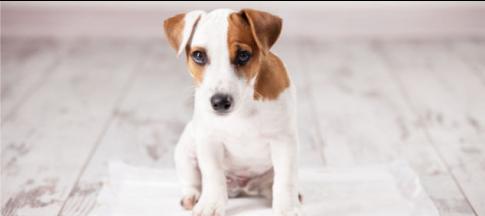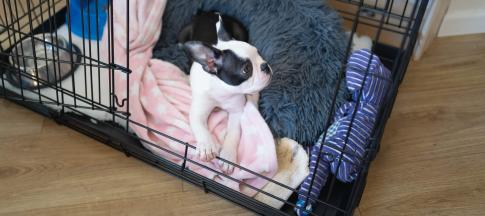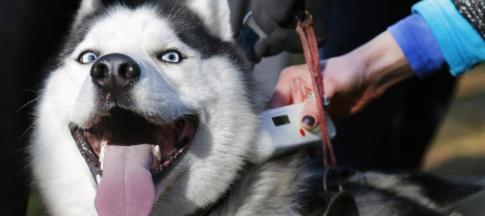
It's important to be as thorough as possible when dog-proofing your home.
It’s not just for the owners of new puppies either – if you're adopting an older dog, you still need to make sure that it is a safe environment for them.
Before you bring your new pet home, take time to check every room of your house (and garden) for any possible hazards.
How to make your garden secure
There's a few things to think about when it comes to your garden:
Fortify your fences
If your dog is lucky enough to have access to a private garden, make sure it's fully enclosed with a high-enough fence.
Depending on the breed of dog, your fence may need to be as high as six feet, as some larger breeds of dog can easily clear a five-foot fence!
Also, check for any gaps or holes in the fence that a smaller dog could slip through or a digging dog could get under.
Check what chemicals you have lying about
There's a few chemicals you might have in your garden, like:
- insecticides, fertiliser
- slug pellets
- paint or solvents
If you have any of these, make sure they're locked away. These chemicals are highly poisonous to dogs and cats, and can be fatal if they ingest them.
Anti-freeze is a particular issue for pets as it contains ethylene glycol, which smells and tastes sweet.
Even a few drops ingested from a puddle would be enough to cause serious kidney damage or even death.
Think about your water features
If you have any ponds and water features in your garden, keep them covered if your dog will be outside unsupervised.
There's the risk of drowning but there's also the risk of getting sick from drinking stagnant pond water.
Check your plants
Think about what you’ve got growing in your garden as there are many plants that are toxic to pets too.
Some of the more common varieties include:
- holly
- mistletoe
- hyacinth
- azalea
- rhododendron
- sweet pea
Check out our guide on which plants are toxic to dogs.
How to dog-proof your home's interior
Stairs can be dangerous for some dogs and you might prefer your pet to stay downstairs.
Stair gates are a useful tool here but make sure everyone in the home remembers to close them.
If you stop your dog from going upstairs, you can have a system of keeping everything that you wouldn’t want chewed on the first floor.
Have a think about your windows and doors too, and what you might need to do to stop a lively dog from escaping when your back is turned.
Also, are there any gaps or nooks that a dog could get stuck in when exploring the house?
Double check your houseplants
Just like in the garden, there are many houseplants that are toxic to pets so make sure that your dog doesn’t get access to them.
The most common ones include:
- lilies
- aloe vera
- poinsettia
- rubber tree plants
- chives
Symptoms of poisoning from ingesting toxic house plants range from sickness and diarrhoea to difficultly breathing and even death.
Again, check out our in-depth guide on which plants are toxic to dogs to find out more.
How to make your kitchen safe
There's a whole host of potential hazards in the kitchen which will need to be addressed before you bring a new dog home.
Some dogs can become quite good at opening cupboards – especially if they know there's something delicious inside – so consider child-proof cupboard locks or keeping certain things higher up out of reach.
The kitchen is often home to all of the household chemicals too and, just like the ones you keep in the garden, can be fatal if eaten by a dog or cat.
These include bleach, washing detergent, dishwasher tablets and oven cleaners. Keep them in locked cupboards or high up out of reach.
Don’t rely on the child safety caps as they're no match for a jaw full of canine teeth!
Kitchen bins
Does your kitchen bin have a lid? Even if it does, there’s no guarantee that a greedy dog couldn’t work out how to get his nose in there for a bit of extra dinner.
The dangers here include cooked bones, packaging, human food that is toxic to dogs and mouldy food.
Even if your dog doesn’t eat anything particularly dangerous from the bin, they're likely to end up with an upset stomach.
Look for a dog-proof bin or keep your dog out of the kitchen altogether.
The dangers of chewing
Puppies in particular love to chew and it becomes more necessary to them when they're teething.
Power cables and other wires are particularly inviting if they're hanging down above a dog’s head, but could prove fatal if they chew through them while they are plugged in.
Make use of cable ties and tidies to keep them up off of the floor and away from your pup’s jaws.
Everything in your home will be seen as fair game to your new dog so remember, if you don’t want it chewed, keep it up high!
This includes your best shoes, children’s toys, books, TV remote controls and homework.
Remember, if you provide your dog with a choice of dog-safe chew toys, they'll be less likely to chew your precious things.
Choking hazards
Puppies, like babies, explore the world with their mouths so anything small that they can pick up from the floor is likely to disappear.
This could be a choking hazard if swallowed or cause an obstruction later on.
Vet surgeons are full of tales of the things they have had to remove from dogs’ stomachs, and common finds include stones, marbles, elastic bands, string, coins and socks.
Be mindful of picking little things up if you spot them on the floor before your pet does.
You should be especially careful around batteries, which can cause burns to a dog’s mouth, oesophagus or stomach if swallowed.
I’ve spent 20 years writing about pets and exploring the wonderful relationships they have with their owners. I started as a staff writer on Dogs Today magazine, working my way up to become deputy editor in 2008. In 2010, I left the office to pursue a freelance career, relocated to north Norfolk and started a family.
Over the years I’ve contributed thoughtful human-interest features, celebrity interviews and investigative news stories to publications including The Sunday Times, Dogs Today, Dogs Monthly and Your Cat. I’ve also ghost-written veterinary books and press releases for the pet industry.
When I’m not writing, I enjoy long walks in the Norfolk countryside with my rescue lurcher Popsie. These are always followed by tea and cake.




